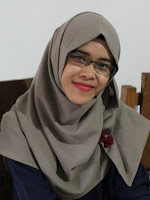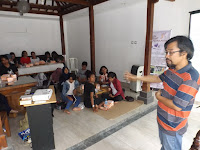Pursuing
ideas and write!
 "Writing fiction is like digging a well with
a needle. It is not easy and a hard work. He should have idea or inspiration, but he cannot
just wait for the idea or inspiration but should seek and pursue ideas",
said Achmad Munjid starting the Workshop on Writing Fiction, on Sunday,
November 5, 2017 at Stube-HEMAT Yogyakarta secretariat. This was a
collaboration between Stube-HEMAT Yogyakarta and team of Magister of
Literature Science of
Gadjah Mada University as a dedication program to community.
"Writing fiction is like digging a well with
a needle. It is not easy and a hard work. He should have idea or inspiration, but he cannot
just wait for the idea or inspiration but should seek and pursue ideas",
said Achmad Munjid starting the Workshop on Writing Fiction, on Sunday,
November 5, 2017 at Stube-HEMAT Yogyakarta secretariat. This was a
collaboration between Stube-HEMAT Yogyakarta and team of Magister of
Literature Science of
Gadjah Mada University as a dedication program to community. Twenty students from
various campuses and regions studying in Yogyakarta and local youth as staffs
of child-friendly village team attended a workshop facilitated by Achmad Munjid, M.A.
Ph.D., a lecturer at Faculty of Cultural Sciences UGM, along with
him were Sulistyaningtyas,
Muhammad Zaenuddin and Fardan Rezkiawan Faida. Three of them were students of
Magister in Literature of UGM. The facilitator felt so glad to meet
participants of Stube-HEMAT Yogyakarta and appreciated Stube’s fast response to
prepare the activity well although in short time and students' enthusiasm to
learn how to write fiction. It was said that writing was like
sport and alms. Everyone knows that these two things are good, but not everyone
wants to do it. People know that writing is good, but how much effort really done by them. Writing is like riding a bike, playing a guitar or swimming,
not just knowing the theory but it needs regular practice.
Twenty students from
various campuses and regions studying in Yogyakarta and local youth as staffs
of child-friendly village team attended a workshop facilitated by Achmad Munjid, M.A.
Ph.D., a lecturer at Faculty of Cultural Sciences UGM, along with
him were Sulistyaningtyas,
Muhammad Zaenuddin and Fardan Rezkiawan Faida. Three of them were students of
Magister in Literature of UGM. The facilitator felt so glad to meet
participants of Stube-HEMAT Yogyakarta and appreciated Stube’s fast response to
prepare the activity well although in short time and students' enthusiasm to
learn how to write fiction. It was said that writing was like
sport and alms. Everyone knows that these two things are good, but not everyone
wants to do it. People know that writing is good, but how much effort really done by them. Writing is like riding a bike, playing a guitar or swimming,
not just knowing the theory but it needs regular practice. Further, there are some points noted in writing
fiction, first, the story is an event that 'disturb' thoughts, conflicts,
dilemmas or irregularities that occur. Second, the plot, the story contains
conflicts, crises and solutions, which include 3D, drama (something
attractive), desire and danger (something challenging). In this section the
author needs to 'play' distance between conflict, crisis and solving, so that
the reader is curious about the story. Third, related with characterization,
there is keyword 'seeing is believing' that the writer should be able to
present the character in the fiction story clearly so that the reader feel the
real interaction with the character. Fourth, point of view of the story, the
first person or third person. Each has its own advantages. Fifth, the background of the
story correlates with time and place of story. It should be specific, real and historical
so the reader feels something real and engages in the story although it
is just fiction.
Finally, the opening and closing, the author can make the opening and closing
of the story gradually or shocking the readers for the effectiveness when
delivering messages of ther story. Sometimes the ending of the story is a
'disturbing' ending that keeps the reader thinking about the story.
Further, there are some points noted in writing
fiction, first, the story is an event that 'disturb' thoughts, conflicts,
dilemmas or irregularities that occur. Second, the plot, the story contains
conflicts, crises and solutions, which include 3D, drama (something
attractive), desire and danger (something challenging). In this section the
author needs to 'play' distance between conflict, crisis and solving, so that
the reader is curious about the story. Third, related with characterization,
there is keyword 'seeing is believing' that the writer should be able to
present the character in the fiction story clearly so that the reader feel the
real interaction with the character. Fourth, point of view of the story, the
first person or third person. Each has its own advantages. Fifth, the background of the
story correlates with time and place of story. It should be specific, real and historical
so the reader feels something real and engages in the story although it
is just fiction.
Finally, the opening and closing, the author can make the opening and closing
of the story gradually or shocking the readers for the effectiveness when
delivering messages of ther story. Sometimes the ending of the story is a
'disturbing' ending that keeps the reader thinking about the story. In the next
session the participants practiced writing fiction. They began to imagine an idea or inspiration, then writing
the opening of a fictional story. There were some participants who wrote stories that were able to provoke the reader's
curiosity, such as Anggita Getza's writing about the mystical incident and
David Pamerean about the explosion in outer space.
In the next
session the participants practiced writing fiction. They began to imagine an idea or inspiration, then writing
the opening of a fictional story. There were some participants who wrote stories that were able to provoke the reader's
curiosity, such as Anggita Getza's writing about the mystical incident and
David Pamerean about the explosion in outer space. At the end of the event,
Sulistyaningtyas, a young writer known as Tyas Effendi, who wrote several
books, such as ‘Tentang Waktu’, ‘Catatan Musim’, ‘Life After You’ and ‘Dance for Two’ gave her books to lucky participants as appreciations. She also shared her writing
experience with her perseverence to write and learn, smart to choose trending
theme for readers and learn the characteristic
of publishers.
At the end of the event,
Sulistyaningtyas, a young writer known as Tyas Effendi, who wrote several
books, such as ‘Tentang Waktu’, ‘Catatan Musim’, ‘Life After You’ and ‘Dance for Two’ gave her books to lucky participants as appreciations. She also shared her writing
experience with her perseverence to write and learn, smart to choose trending
theme for readers and learn the characteristic
of publishers.
The ability to write
fiction is a learning process, it needs to be continuously trained from now on.
So, let us ignite motivation, pursue ideas and write. Make your fiction writing
as an inspiration
that enlightens reader. (TRU).
















Comments
Post a Comment